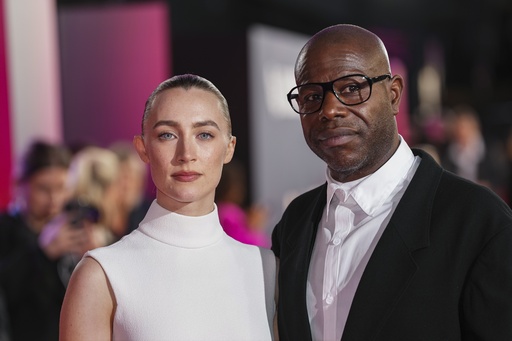
Oscar-winning director Steve McQueen embarks on an enlightening journey with his film “Blitz,” inspired by a singular photograph of a young boy on a train platform carrying a large suitcase amidst the backdrop of World War II’s devastating bombings in London. McQueen, a native of the city, finds these haunting reminders of the past intertwined with his everyday life. However, the compelling image of the boy—who was Black—ignited McQueen’s curiosity about the child’s narrative and pushed him to explore the untold stories awaiting revelation.
The narrative centers around George, a 9-year-old biracial boy living in East London, portrayed by young actor Elliott Heffernan. His life, alongside his mother Rita, played by Saoirse Ronan, and grandfather, is thrown into chaos by the war. As a precaution, George is sent away via train to the countryside but decides to embark on a perilous journey back home in search of his mother. This path leads him through an array of encounters, showcasing the emotional weight and depth of experiences colored by that historical time.
Once McQueen completed the screenplay, self-doubt crept in regarding whether George was based on reality or if an actor could aptly play the role. After a rigorous open casting call, Heffernan was chosen. The 9-year-old, whose prior involvement in acting was limited to a school play as the genie in “Aladdin,” exhibited a unique quality—an innate stillness reminiscent of classic silent film stars, making him an ideal fit for the role.
Now 11, Heffernan has adjusted well to the film set, contributing to various scenes filled with stunts. He expressed a preference for the thrilling days filled with action. Throughout the filming process, Ronan helped mentor Heffernan, enabling him to navigate the complexities of the movie industry with ease. In addition to garnering attention for his performance, Heffernan has plans for future projects and has enhanced his knowledge of the WWII era, impressing his educators along the way.
Ronan, eager to collaborate with McQueen, mentioned a desire to explore various stories in her career, yet sought a voice amid her break after wrapping “The Outrun.” Her excitement about encapsulating the love story between mother and son within the context of wartime resonates deeply. The narrative highlights not just the challenges but also the community dynamics experienced within war-torn settings, emphasizing resilience and everyday trials faced by those remaining home.
To add a musical element to the film, McQueen sought out Ronan’s singing capability, necessitating a vocal coach to assess her talent while she was on location in Australia. The positive evaluation she received allowed McQueen to confirm her role, enriching the layers of storytelling within “Blitz.” Both Ronan and Heffernan would share the screen with musician Paul Weller, who makes his acting debut as George’s kindhearted grandfather, alongside Ronan who delivers a standalone performance in an emotionally charged song inspired by McQueen’s late father.
The inclusion of a munitions factory in the film is a pivotal narrative choice. McQueen highlights the often-ignored contributions of women during the war. Their roles transcended the scripted portrayals often depicted in films. Instead of merely being the supportive partner, women were deeply integrated into the war effort, from managing evacuations to working in munitions factories while handling familial responsibilities.
While critiques have labeled “Blitz” as one of McQueen’s more conventional endeavors, he contests that such views overlook its revolutionary narrative. The film cleverly incorporates classic storytelling tropes, yet it aims to shed light on histories that have often been sidelined. Audiences are transported to previously unseen locations, from bomb shelters to vibrant cafés, revealing the stark contrasts faced during the war. Additionally, characters like Mickey Davies and Ife, inspired by real individuals, illustrate the diverse experiences that provide historical context to George’s adventures.
Ronan connects the film to her own experiences in East London, where remnants of history persist within the fabric of daily life. She appreciates the enduring spirit of resilience within local communities and acknowledges the importance of paying homage to their stories. For McQueen, telling these untold narratives serves as a crucial extension of his previous work, further emphasizing identities historically overlooked in discussions surrounding national identity and heritage linked to the Blitz.
Amidst the grand set pieces and historical events, McQueen deeply cherishes the emotional core of “Blitz.” He emphasizes that the soul of cinema resides in the heartfelt connections it cultivates. Fostering love between characters is at the forefront of his vision for the film, and he hopes audiences resonate with this emotional journey. Early previews at film festivals have elicited powerful responses, confirming his belief in the transformative power of cinema and illustrating universal stories told through the eyes of a child.
